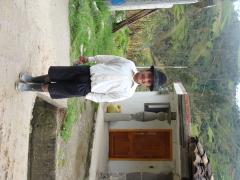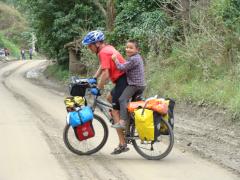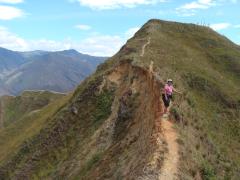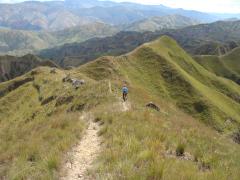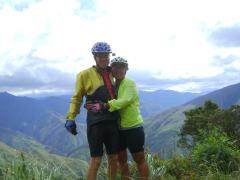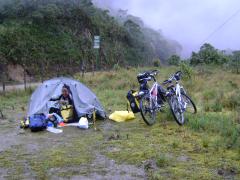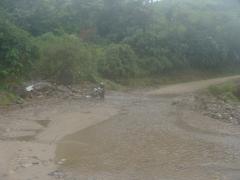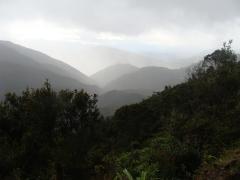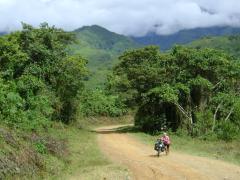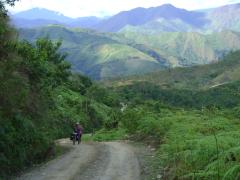Cuenca to the Peru Border
The ride from Cuenca to the Peru border was one of the best and most beautiful (and hardest) rides so far on this trip. We rode on quiet roads, some paved but most dirt. The landscape was gorgeous and the views amazing. We rode through small indigenous villages where the women wore colorful traditional dresses, jewelry, and felt hats. The traffic was almost non-existent as soon as we left Cuenca. It picked up a little as we rode in and out of Loja. In Loja by chance we met Chaski, a Peruvian man who is walking the Inca trail, learning about the traditional ways people grow potatoes. He is an educator and he is connecting the indigenous people of South America together. We had met him in the far north of Ecuador and got to have dinner with him again.
The next day we rode to Saraguro, a pleasant village with proud and friendly people. The people seem to have a nice life, a sense of community and continue with the traditional Ecuadoran Indigenous life style. Many of the indigenous villages we had passed through seemed reserved and hardship seems to weigh on their shoulders. This village was strikingly different. It was a much happier place. The people more open and had smiles to share. We wanted to stay for the Sunday market but Vilcabamba was calling us.
Vilcabamba is a village of a few thousand people which has a reputation of being a wonderfully healthy place to live. The people supposedly live a long time there due to the magical properties of the water and the climate. I knew if we went there and spent a few days we would also benefit from the magical place. I wonder if by just visiting the place we can also extend our lives, living happily and healthy to 110. Stay tuned for another 60 years and you can find out.
We stayed at the Hotel Izhcayluma, 2 kilometers south of town. The place was so relaxing with hammocks outside our room and views of the Podocarpus National Park and priced right for our budget. Randy and I played ping-pong for hours, and shot some pool and played chess. I entered a ping-pong tournament where the winner was supposed to jump in the pool naked. Luckily I was knocked out of the competition the second game I played, but I did lose to the eventual winner. On the second day there we hiked for 5 hours, leaving from the hostal, passing through the outskirts villages of Vilcabamba, and up then along a path that followed a knife-sharp ridge. You could look down to the left, viewing one valley 1000 feet below and the view to the right was the town of Vilcabamba more then a 1000 feet below. The ridge wound it way down to a dry river bed which we followed for another hour. The next day we hiked in the Rumi Wilco Reserve. This nature reserve was created by an Argentinian couple, Alicia and Orlando Falco, in an effort to reverse the environmental degradation caused by slash-and-burn agriculture. Randy hiked up to the higher parts of the reserve getting himself in and out of trouble while I found a hammock to have a nap. I ended the day with a well-deserved one-hour massage.
After three nights of pampering, we hopped back on the bikes and slowly rode to the Peru border. Again the steep climbs caused us to get off our bikes and push up the steep parts. The nice pavement ended after just 20 kilometers (for the next week) and the real work started. We climbed up over the continental divide somewhere in the Podocarpus National Park. The road was muddy because of the amount of rain that falls in this cloud forest. We had several stream crossings. Randy rode through them, but I changed into my sandals and walked across. Sometimes we could see foggy vistas, but sometimes the clouds limited us to views of the mossy vegetation we rode by. Tiny flowers sprung out of the cliff-hanging moss and orchids thrived in this perfect environment. We topped the climb at 2772 meters thinking we were about to descend 1000 meters into Valladolid. It was cold and windy. I dressed in all the warm clothes I had and rode hard to stay warm. We did descend just a bit, and it got a hair warmer, but it started to rain harder too.
The ride was enchanting and we lost track of time in this misty wonderland as dark descended around us. Not a house or a finca was anywhere to be found. We considered setting up the tent along the graded banks of the road but we knew that camping 5 feet from the road was not optimal so we continued our search. When we crested the next climb we found a flat marshy spot under some electric wires, a safe distance from the road. As quickly as we could we set up the tent and dove in. The rain which was to this point gentle had changed its characteristic and hit us hard. We dragged all of our panniers into the vestibule of our tent and settled in for the night. Unfortunately we dragged our wet selves into a dry tent and contaminated our dry sanctuary. With wetness everywhere we did manage to sleep most of the night.
We did twice hear trucks stopping at the crest of hill and getting out. We held our breaths and listened as we heard the doors open and men´s voices appearing outside the cabs, talking and laughing. They hung around their trucks for a short while before driving away. Our little flat plateau must of been the only place to have a pit stop to relieve their bladder from the pounding of the rough, dirt, muddy road. A few cars more drove by and beeped at us. After having dinner of cold granola, we feel asleep and dreamed we would not wake up drowned rats. When we woke up in the morning the rain continued as we packed up. It seemed warmer in the morning as we put on our damp clothes. We rode on to the small town of Palanda.
We had planned on spending the night there. As I went looking for hotel, I found a bus to Zumba instead. I did not want to climb the 5000-foot (1500 meter) climb to Zumba on the wet, dirt, slippery muddy, steep, cold, treacherous road. We took the one o´clock bus to Zumba. We stuck the bikes and our gear under the bus in the large luggage storage area. The views were tremendous and I was glad to be in a nice dry, warm bus.
We checked into a hotel in Zumba that had a covered roof top and a washing basin. We washed the mud of all off our gear and hung it overnight to dry. The next day we set out for the Peru border. Again the climb was tough, and I walked a fair number of places that just took too much energy to ride. At the top of the biggest climb we crossed through the second military checkpoint in the area. Randy talked with the officer in charge, Hector, about our trip. He had so many questions and was truly interested in our experience. The two younger soldiers just looked on with amazement. We found out that all men in Ecuador are obligated to serve for one year. Or they can pay $40 to be exempt from service. These soldiers were stationed here for 24 hours and then had 24 hours off. They wrote down our passport information and wished us well as we climbed the last hill of Ecuador. I walked half of it.
The last few miles was downhill to the river and to the new bridge at the La Balsa, the border crossing. The last section was downhill and so steep, I could not ride it. Randy rode my bike as I walked. A fitting end to the steep hills of Ecuador.

